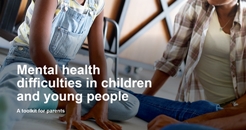 Mental health difficulties in young people: a toolkit for parents
Mental health difficulties in young people: a toolkit for parents
From an initiative by the City Mental Health Alliance
The City Mental Health Alliance (CMHA) is a not-for-profit membership organisation. They are an alliance of businesses, working together with mental health experts and partner organisations, to achieve their vision that every workplace will protect, support and create positive mental health for their people.
Recently, CMHA partnered with PwC UK, the Bank of England and Morgan Stanley to create a toolkit for parents concerned about their children’s mental health.
It is worrying and stressful for any parent to see their child having difficulty with their mental health, and when you search for information it can be hard to know where to start. That’s why they’ve compiled a toolkit; to provide an overview of the key topics, signpost to further information from trusted sources, and share insights from parents and young people who have been through it.
The toolkit will help you to:
-
understand good mental health and mental health difficulties in children and young people
-
be aware of why and when difficulties can arise and what to look out for
-
know how to help your child if they are struggling
-
know when and how to get professional help
-
understand that you need to look after yourself, too.
If your child is going through a mental health crisis and you need help now, there is also a section on what to do if you are worried.
Mental health refers to the way we think, behave and feel. Like their physical health, our children’s mental health can change over time, and any child or young person can experience mental health difficulties.
In 2020, one in six children (16%) aged five to 16 had a probable mental health disorder up from one in nine (11%) in 2017. We don’t know for sure what factors caused the increase, but living through the Covid-19 pandemic has undoubtedly had an impact.
Beyond Covid-19, most children have challenges in their lives that could pose a risk to their mental health. Some people are genetically more prone to a mental health condition if it runs in the family. However, most children also have things in their life that balance out those risks and help them to bounce back from difficulty. These are called resilience factors. They could include a strong relationship with a trusted person, enjoyment of school, interest in sports or other activities, good friendships, having spiritual or religious faith.
Everyone has a unique combination of risk and resilience factors and, as parents, we can support our children to get into good mental health habits and build up their defences. Nevertheless, we can’t prevent our young people from struggling sometimes. That’s why it’s important to recognise the signs of mental health difficulty, to know how to support your child to cope, and when and how to seek extra help.
No parent wants to see their child struggling. Mental ill health can be really upsetting and frightening because it can make our loved one sad, fearful, angry or unpredictable. If you’re going through this right now, remember that:
-
You and your child can get through this. Lots of young people experience mental health difficulties and come out the other side. Modern therapies and treatments – if they need them – are really effective.
-
You are not alone. Every situation is unique but right now there are thousands of families in the UK with a child with mental health difficulties, and thousands more who have been there in the past.
So reach out for support.
Download the toolkit from here.
Retweet about this article:
From an initiative by the City Mental Health Allia, 23/03/2022